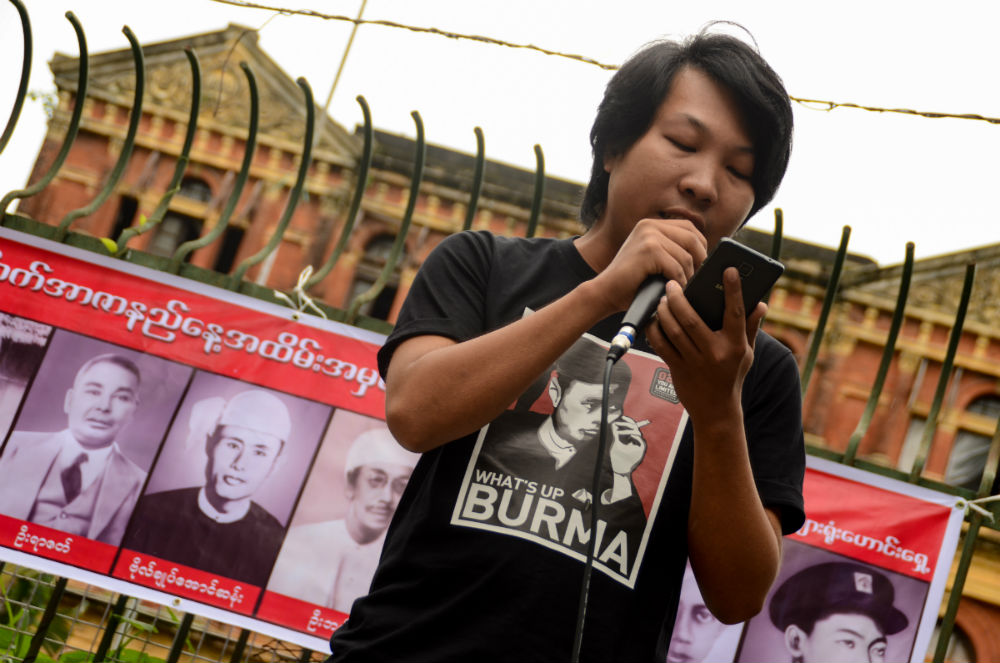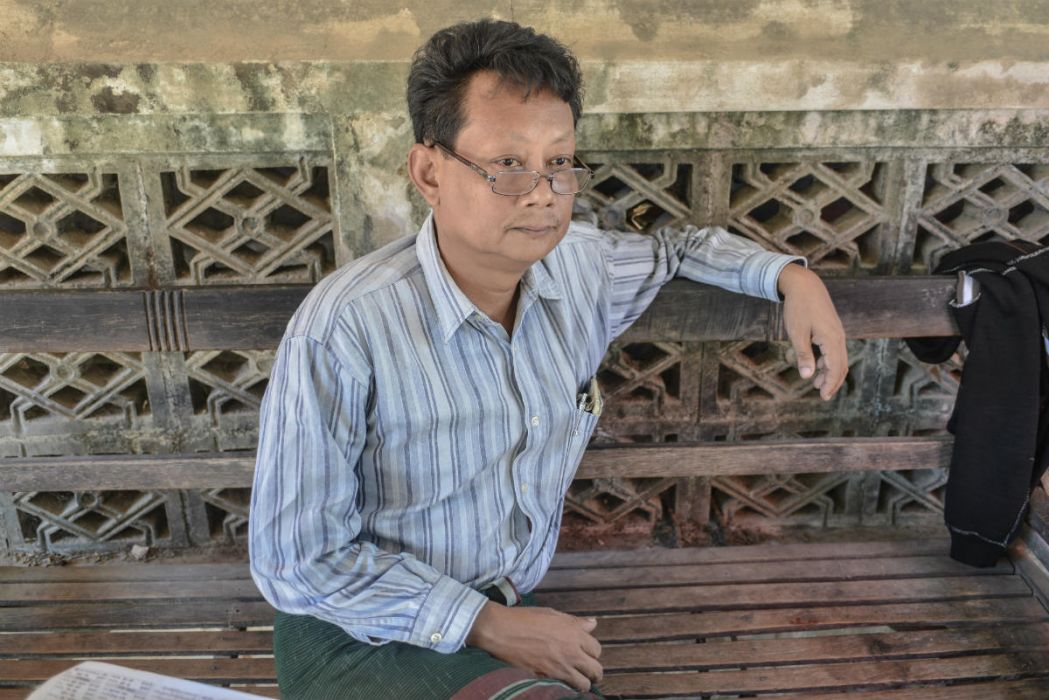Maung Tin Thit, sitting outside his office in Naypyitaw. Photo / Aung Naing Soe / Coconuts Yangon
Maung Tin Thit is looking forward to early next year when he swears in as a member of parliament.
As a former political prisoner who spent 7 years locked up for his activism, the lawmaker-elect will have a chance to effect change from a position of influence for the first time in his life.
He has no shortage of ideas for his community, a rural township on the outskirts of the capital, Naypyitaw.
But he’s also looking forward to the experience for creative reasons.
“I write poems only when I want to write and I have something that’s inspiring. In parliament I’ll have a lot of things to get inspiration from,” he said in an interview at his office last month. “I think I will probably have more poems.”
Tin Thit is one of 11 poets elected on November 8, all under the banner of Aung San Suu Kyi’s National League for Democracy, which won almost 80 percent of the available seats in the national legislature.
The sheer number of bookish scribblers heading into office has attracted international attention, but it didn’t surprise Tin Thit.
“It is not really strange for Myanmar that poets were elected” in the November 8 vote, he said.
Poetry has been a feature of the Burmese cultural landscape for hundreds of years, figuring prominently in the royal courts of different dynasties, but the form took on a more dissident and political bent during the early part of the 20th century.
In the years after World War 1, a nationalist named U Lun wrote verses using the pen name “Mr. Maung Hmaing,” a satirical pseudonym meant to make fun of Anglicized Burmese.
“His odes extolled the glories of Burma’s great past and exhorted his countrymen to throw off the foreign yoke,” wrote author U On Pe as part of a 1958 supplement published by the Atlantic magazine.
The tradition grew stronger in the 1930s at Rangoon – now Yangon – University, with the so-called Khitsan movement. Poetry and other forms of writing became even more intertwined with politics after independence in 1948. U Nu, Burma’s first democratically elected prime minister, recounts in his memoirs that he wanted to be a playwright, not a politician.
The military regime that took over in 1962 did not tolerate dissident verse, but the effect of censorship and the muzzling of free expression only made writers get more creative, deploying pen names and abstract language. The line between poet and pro-democracy activist became increasingly blurred.
Tin Thit said there were “hundreds” of poets who became political prisoners. He would know. He was one of them.
“We can say that poets stick together with the people in the democracy movement,” he said, referring to the protests against the junta that started in 1988.
Tin Thit reads his poem entitled “This Award” at his campaign office in Naypyitaw
The relationship with the then-fledgling National League for Democracy was forged in this struggle.
“In the past, I was the middleman between ‘The Lady’ [Aung San Suu Kyi] and the poets,” said Maung Nyein Thit, one of the other scribes elected to parliament, filling a lower house seat for the NLD in Mandalay.
“We tried to work for her release [from house arrest],” he said. “We have collaborated with the NLD for a long time.”
Censorship came to an end with the transition to civilian rule in 2010 and 2011, but poetry continued to be relevant, and not just with members of the opposition.
The pro-government Global New Light of Myanmar publishes poetry on a wide range of topics, including traffic and breastfeeding. When thousands of people came to the Secretariat earlier this year to remember independence leader Aung San, readings took place outside the colonial building.

And it can still get you in trouble.
23-year-old Maung Saungkha knows this well. Saungkha is sitting in a Yangon jail after writing a poem about having a tattoo of the president on his penis. It was provocative satire, but he was arrested shortly after the offending words went up on Facebook. He is still awaiting trial.
“We have so many problems like that,” said NLD lawmaker-elect Nay Phone Latt in a recent interview in his Yangon office, referring to Saungkha’s case.
The writer and former political prisoner won a seat in Yangon’s regional parliament.
“Some of the people said that we already have freedom of expression, but it’s not totally true. Compared to the military, we have some, but the freedom we have is state-limited. They still have the boundary. If you go over the boundary and limitation, everybody can get into trouble. So we still need to fight for freedom of expression. That is why I think some writers, authors and poets joined the parliament.”
But what do those outside of politics think of the road ahead for their literary peers? Will they be corrupted by power? Or will their creative spirits be just what the new government needs?
Maung Sein Ni, a respected senior figure in Myanmar’s poetry circles and the editor of Padauk Pwint Thit Literature magazine, offered a clue to the current thinking.
“Poets are always standing on the side of truth,” he said. “Now, the truth will be in parliament.”
Photos / Aung Naing Soe / Coconuts Yangon





Reader Interactions